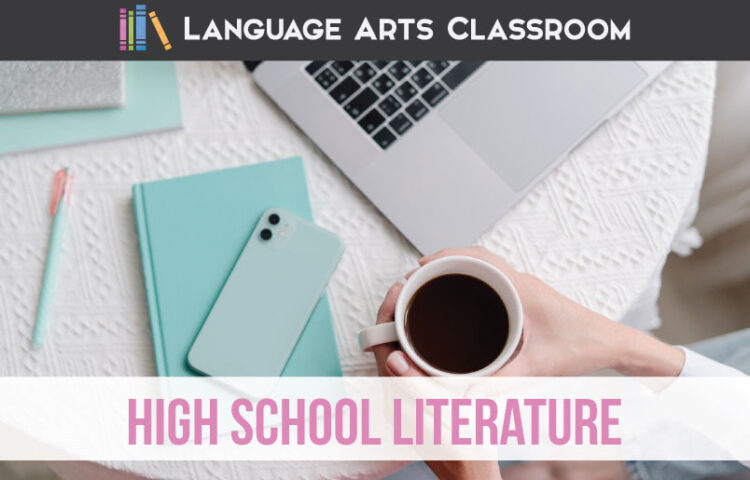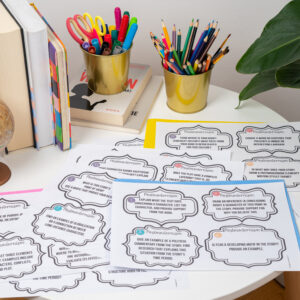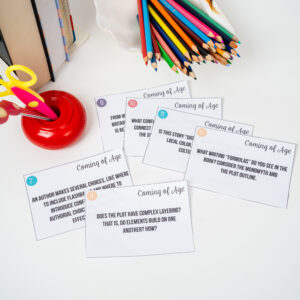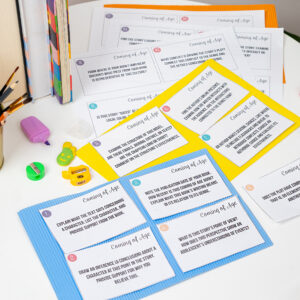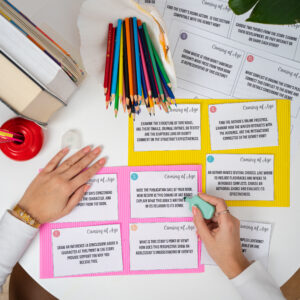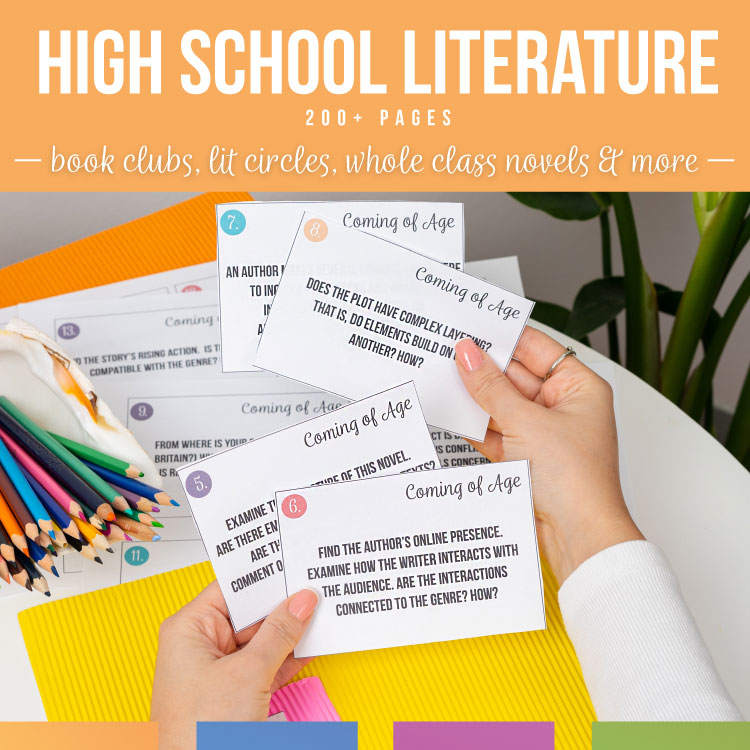High school literature essential questions can shape whatever stories you teach.
Many of us English teachers love to read and partially teach language arts because books have saved us in some way. Not all of us, but many, love to teach literature.
I love teaching English for many reasons—and the growth and connections with literature ranks high.
Teaching literature with young adults opens the world to them and to use. Constructing lessons and meeting standards and implementing fresh books and staying abreast of cultural implications. . .
takes time.
Time that is very precious for busy ELA teachers.
Below, I’ve broken down three high school literature essential questions my students and I discuss. Under each question, I provided discussion topics and ideas for use that align with the question. Then, I will walk through a breakdown of ideas.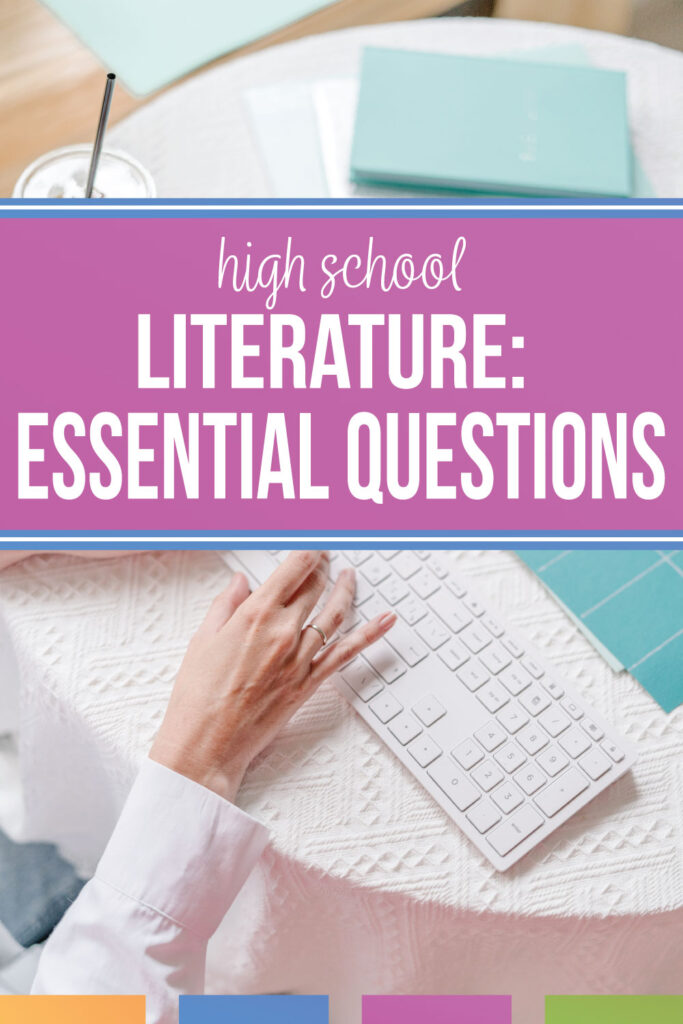
Why do you use high school literature essential questions?
Transitions and connections allow for clarity with literature. Discussions spur from essential questions and build to previous readings. Hopefully, my thought process inspires or helps other high school literature teachers in some way. Build off my starting points!
Essential question one:
What stories are told?
Discussion topics:
Question the canon of literature, banned books, storytelling, textbook choices, publishing houses.
Breakdown of ideas:
This first and basic question is a great starting point. Older students can tackle the essential question of “what stories are told?” especially if you frame the definition of “story.” Is a story an oral recount told at family reunions? What about biblical stories, fables, and mythological tales? Gossip in the halls that turns into urban legends?
Another framing device for this question is where stories are told. Consider:
- Family gatherings
- Religious gatherings
- Schools
- Friends’ houses
- Social media
- News channels
- Books, magazines
If we look at what stories we have experienced growing up, look at how those stories shaped our ideas and beliefs. we can then discuss where our current stories fit. Be ready for students to question what stories you are reading in class—a good point, I think, because then students are challenging what adults tell them.
Do you need more high school literature ideas? Read how I run literature circles with older students.
Essential question two:
How can readers, media consumers, digital citizens, and more, purposefully consume texts?
Walk students through their days to identify where they consume texts, define “texts,” and list where they do not see texts.
Students know that they consume information. Rarely do I find that students can articulate the depth of audience targeting done by publishing houses, advertisers, social media companies, and media conglomerates.
One way to examine this complexity is to list companies for students to investigate: Comcast, Walt Disney, AT&T, Paramount, Sony, and Fox.
Turn students loose. ask them to look at how we communicate, and who controls our information. Students are often shocked.
For instance: do we communicate through music? Are some companies that control our information involved in our finances? Who is involved in trademark laws, and what are the implications of that involvement?
Older students are sometimes voters—other times, they are approaching voting age. They work and pay taxes. They drive. Some are parents, and some are married.
They should be aware of who is giving them information so that when they consume it, they can questions motivations.
Do you need specific ideas for teaching media literacy?
Essential question three:
How has literature shaped your life?
Look at all books and stories from earliest memories to present day. I often ask students to fill out a form that lists picture books to get their memories activated.
Once we have a master list of literature (it is fun to create this list!), then we focus on one of my favorite high school literature essential questions: How has literature shaped your life?
With a mater list (or anchor charts or one-pager), then draw conclusions from what these stories have taught us about life. What morals did they teach? What norms did they establish? Did they question any part of the human experience? Why was this story given to you? Often, our discussions head into a discussion of stereotypes, which then leads into a discussion concerning
And—what is missing? If stories matter, and adults use stories to teach—now that these high school literature students are at the end of their childhoods (so to speak)—what is missing?
What story or lesson did they think they needed, or what perspective is missing?
Often, this time is where I encourage students to think critically, and we can then wrap all of our essential questions together.
English Class Essential Questions
Part of any language arts class is challenging the text in numerous ways. We can delve into the world of literature through literary theories combined with essential questions. Often, high school students consume stories but don’t critically analyze them. Understanding the motivations behind the information presented is crucial in developing literacy skills.
At the very basic, students can discover how stories have shaped their lives. By reflecting on the books and stories that have influenced them from their earliest memories to the present day, students can draw connections between narratives and real-life experiences.
Questions help to guide students. I think, and I know I am guilty of, not understanding where students start with approaching stories. For years, young readers have related literature to themselves, which is great.
Now, we are asking them to apply new concepts to literature, to concern themselves with larger concepts. High school literature essential questions can shape and outline a starting point for new literary analyzers.
Do you need modern short stories for teaching?

